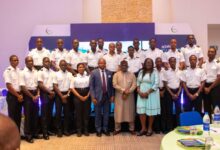
The Port Community System (PCS) being championed by Nigerian Ports Authority (NPA) for easy integration and data sharing among stakeholders in the nation’s port is almost set to go live .
This was disclosed by the management of the NPA in a recent public statement issued in Lagos where it reaffirmed readiness to synchronize with National Single Window (NSW) project of the Federal Government gains momentum.
It stated further that the NPA has propelled to conclusive stages in readiness for the plug-in of relevant stakeholders as the implementation of the National Single Window (NSW) project of the Federal Government gains momentum.b
The NPA in the statement said the Abubakar Dantsoho-led Management of the Authority is assuring all stakeholders and the generality of Nigerians of its unwavering commitment to deepening the competitiveness of Nigerian Ports through infrastructure and equipment renewal which it has commenced.
At a recent Port Industry Town Hall meeting convened by JournalNG, a leading maritime publication,the NPA MD said the authority is actively working towards the implementation of the PCS which is a unified digital platform that will integrate all Port Stakeholders, including Terminal Operators, Shipping Lines, Freight Forwarders, and Regulatory Agencies. When fully deployed.
Dantshoho, who was represented by the Port Manager of the Lagos Port Complex, Mr Ibrahim Lawal, said the PCS will significantly enhance the coordination of 24-hour operations by allowing seamless data exchange and real-time visibility of Port processes.
The PCS has become a global trend for modern ports for which NPA is moving to align Nigeria with her peers maritime countries and reap from the benefits of installing such tech driven infrastructure
Sources at the NPA told JournalNG that a reputable international company with a pedigree for revolutionising trade across many countries has been contracted to help actualise the PCS creation and sustain stakeholders interaction online and real-time.
With the move by Dantsoho,Nigeria is gearing up to align with global maritime requirements stated by Tlthe International Maritime Organisation (IMO) which requires every member country seaport to become fully automated by 2025.
With the backing of the Minister of Marine and Blue Economy,Adegboyega Oyetola, who had earlier received the interim and final reports on the project, the PCS is expected to promote transparent, time saving and prevent crime.
Stakeholders are optimistic that with an effective PCS regime,Nigeria would be ranked as a country with faster vessel turnaround time. It is also anticipated to guarantee seamless communications among government agencies and private operators with greater level of security from the berthing areas through the quayside, terminals and other areas within the port ecosystem.
Port Community System (PCS) is a digital platform that connects stakeholders in a port ecosystem—such as port authorities, shipping lines, customs, freight forwarders, and logistics providers—to streamline operations and data exchange.
Some of the key benefits of PCS are
Enhanced Efficiency
Automates processes like cargo tracking, documentation, and clearance, reducing manual work and delays. For example, real-time data sharing cuts vessel turnaround times.
Improved Collaboration: Centralizes communication among stakeholders, ensuring seamless coordination between customs, terminal operators, and shippers.
Cost Savings
Reduces paperwork, errors, and waiting times, lowering operational costs for port users. Digitized processes also minimize penalties from delays.
Transparency and Traceability
Provides real-time visibility into cargo status, improving supply chain predictability and accountability.
Faster Customs Clearance
Integrates with customs systems for quicker declaration processing, reducing border delays and enhancing trade compliance.
Data-Driven Decisions: Offers analytics and insights from shared data, enabling better planning and resource allocation for port operations.
Environmental Benefits
Optimizes vessel and truck movements, reducing fuel consumption and emissions through efficient scheduling.
Security and Compliance: Enhances data security and ensures compliance with international trade regulations through standardized, auditable processes.
Scalability: Supports growing trade volumes by accommodating new users and integrating with global trade systems.
Competitiveness
Modernizes port operations, making ports more attractive to global shipping lines and boosting regional trade.
For instance, ports like
Rotterdam and Singapore leverage PCS to handle millions of containers annually with minimal delays, setting a benchmark for efficiency












wqv2a5